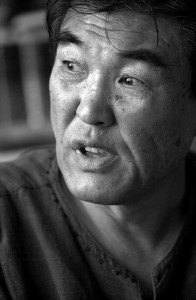From the Darkness
Kim CHI-HA (b. 1941, Korea)
From the darkness yonder
Someone is calling me
A pair of glaring eyes lurking in the darkness
The blood-red darkness
Of rusty prison bars.
Silence beckons me
And clogged, halting breath.
On a rainy day of grey lowering clouds
Faltering through the calls
Of pigeons cooing the eaves
It keeps calling and calling me
A tattered blood-stained shirt
Hanging from the window sill
That red soul which thrashed through endless cellar-nights
the congealed cry of a body racked and torn
Beckoning me
Beckoning me.
The silence yonder is calling me
Calling on my blood
To refuse
To refuse all lies.
From the darkness yonder
On a rainy day of grey lowering clouds
From that darkness of blood-red bodies
A pair of glaring eyes.
Din întuneric
(Kim Chi-Hua (n. 1941) Poet Corean)
Din întunericul de departe
Aud o chemare
Doi ochi ţintesc din ceaţă
O ceaţă ca roşul sângelui
Zăbrelelor din închisori
Liniştea mă îndeamnă
Cu un suflu stânjenit, sugrumat.
Sub o ploaie deasă de nori grei si negri
Stânjeniţi de cântecul
Turturelelor de pe streaşină
Care mă cheamă neîncetat
O cămaşe ruptă însângerată
Atârnată pe fereastră
Acel suflet bătut în nopţile nesfârşite
Ţipăt îngheţat al trupului schilodit pe roată
Îndemnându-mă,
Îndemnându-mă.
Tăcerea de departe mă chiamă
Îndeamnă sângele
Să refuze
Să refuze orice minciună
Din întunericul de departe
Aud o chemare
Doi ochi ţintesc din ceaţă.
Versiune în limba Română
de Constantin Roman
Londra, 21 Septembrie 2012,
© 2012, Copyright Constantin Roman
BIOGRAPHICAL NOTE:
Kim Chi-ha (actually Kim Yong-il) was born in Mokpo in South Korea in 1941. He began to study aesthetics at the Seoul National University in 1959, and published his first poems in »Shi-in« (tr.: The Poet), a literary journal in Korea, in 1969. »The Five Bandits« (tr.) appeared in 1970.
This social satire emulates the rhythm of the traditional Korean Pansori, the author, however, merges the popular epic style with the poetry of resistance, and expands its scope by including themes and motifs that reflect the everyday life of farmers, fishers, and workers. His anthology »The Yellow Earth« (tr.) is published in the same year. The poet converted to Catholicism in 1971, and the authorities prohibited the performance of his plays »The Copper Yi Sun-sin« (tr.) and »Napoleon Cognac« (tr.). A strong opponent of the dictatorial regime of Park Chung-hee, Kim Chi-ha, whose nom de plume means »underground«, was arrested several times and finally sentenced to death in 1974. The verdict was changed to a life sentence shortly after. Thanks to the sharp protest of an international committee, involving Jean-Paul Sartre, Heinrich Böll, Noam Chomsky and others, Kim Chi-ha was set free in 1975, but soon imprisoned again, and released only in 1980 for humanitarian reasons. While, in the years of the dictatorship, the poet saw the poem as a »weapon of the word«, he gave up his role as the mouthpiece of the democracy movement after the ban on his poems was lifted in 1984. He turned towards a »philosophy of life« that has its roots in traditional Asian thinking, which is reflected in his poems in the early 1980s. His lyrical oeuvre is henceforth dedicated to the contemplation of nature, the recognition of universal contexts, and the themes of love, death, grief and loneliness.




No Comments so far ↓
Like gas stations in rural Texas after 10 pm, comments are closed.